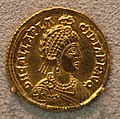| Name | Image | Dates | Details |
|---|
| Argentaria Polla | | c. 1st Century AD | Patroness of Martial and Statius. She was also the wife of the Roman poet Lucan. |
|---|
| Procula | | c. 1st Century AD | Wife of Pontius Pilate, the fifth governor of the Roman province of Judaea, who presided over the trial of Jesus and later ordered Jesus' crucifixion. |
|---|
| Pomponia Graecina | | died c. 83 AD | The wife of Aulus Plautius, the general who led the Roman conquest of Britain. She was speculated to have been an early Christian, and is a saint honoured by the Roman Catholic Church. |
|---|
| Julia Domna |  | 160 – 217 AD | Wife of Septimius Severus and Mother of Caracalla and Geta. |
|---|
| Julia Maesa |  | before 160 AD – c. 224 AD | Grandmother of Elagabalus and Alexander Severus. Best known for her plotting the restoration of the Severan dynasty to the Roman throne after the assassination of Caracalla and the usurpation of the throne by Macrinus. |
|---|
| Julia Soaemias |  | 180 – 222 AD | Mother of emperor Elagabalus, she was her son's regent. After an uprising led by the Praetorian Guard, she entered the camp to protect her son, but was slain along with Elagabalus by the Praetorian Guard in 222. |
|---|
| Julia Avita Mamaea |  | after 180 –235 | Mother of Roman emperor Alexander Severus and remained one of his chief advisors throughout his reign. She was killed in 235 by rebel soldiers along with her son. |
|---|
| Ulpia Severina |  | c. 3rd Century AD | Wife of emperor Aurelian. After Aurelian's death, she briefly ruled the Roman Empire, until the new emperor, Marcus Claudius Tacitus was chosen by the Senate. |
|---|
| Galla Placidia |  | 388–389 or 392–393 – 450 | Daughter of the Roman emperor Theodosius I. Mother to emperor Valentinian III. She became queen consort to Ataulf, king of the Visigoths from 414 until his death in 415, and briefly empress consort to Constantius III in 421. |
|---|













